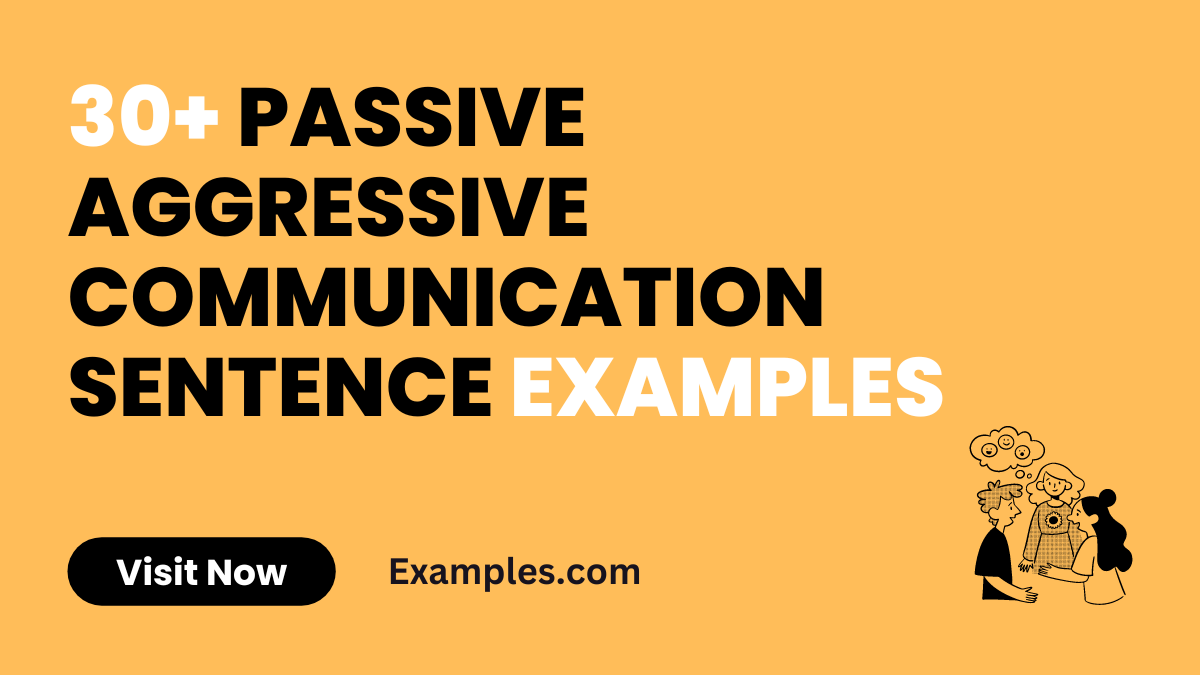29+ Passive Aggressive Communication Sentence Examples
Navigate the intricate world of passive-aggressive communication with our comprehensive guide, complete with examples. This guide delves into the subtle yet impactful realm of passive-aggressive sentences, offering a wealth of Passive Aggressive Communication Examples. Learn to identify and understand the underlying messages in such communications. Our carefully curated examples and explanations provide valuable insights into this complex communication style, making it an essential resource for anyone looking to improve their interpersonal interactions in various settings.
What is Passive Aggressive Communication Sentence? – Definition
A Passive Aggressive Communication Sentence is a type of communication where a person expresses negative feelings or aggression indirectly rather than openly. These sentences often carry a tone of sarcasm, disguised hostility, or subtle jabs. They are a hallmark of passive aggressive behavior, where the speaker’s words may seem neutral or even positive, but their underlying intent is often critical or antagonistic. This form of communication is common in scenarios where direct expression of anger or frustration is suppressed or discouraged.
What is an Example of a Passive-Aggressive Sentence?
An example of a passive-aggressive sentence is, “I’m not saying you forgot to send the report, but someone certainly did.” This sentence illustrates the hallmark of passive-aggressive communication. On the surface, it seems to be a mere observation. However, the underlying message is accusatory and implies negligence on the part of the listener. The speaker is expressing disapproval or frustration but does so indirectly, making it a classic example of passive-aggressive communication. This kind of sentence often leads to confusion and can strain relationships, whether in personal interactions or in the workplace.
30 Passive Aggressive Communication Sentence Examples

Passive-aggressive communication is a complex, indirect way of expressing negative feelings. This guide presents 30 distinct Passive Aggressive Communication Sentence Examples, each accompanied by a detailed explanation and communication context. These examples highlight the subtlety of passive-aggressive sentences, often found in everyday conversations, workplace interactions, and personal relationships. Understanding these examples is crucial for recognizing and addressing passive-aggressive patterns, whether in passive-aggressive communication examples in the workplace or in personal scenarios.
- “Sure, I’ll do it, just like I do everything else around here.”: This sentence implies resentment for feeling overburdened. The speaker agrees to the task but indirectly expresses their frustration about always being the one responsible.
- “I’m not mad. Why would I be mad?”: Despite claiming not to be upset, the tone suggests otherwise. The speaker is likely upset but is avoiding direct confrontation about their feelings.
- “I thought you knew how to do simple tasks.”: This sentence undermines the listener’s competence. The speaker uses sarcasm to criticize, suggesting the task wasn’t done correctly.
- “No, go ahead, I’m obviously not busy.”: Used when interrupted, this implies that the speaker feels their time or work is being undervalued, showing disguised irritation.
- “I’m fine. It’s not like anyone cares, anyway.”: Here, the speaker denies being upset while simultaneously suggesting they feel neglected or unappreciated.
- “Interesting how you always have an excuse.”: This implies skepticism about the listener’s honesty or reliability, subtly accusing them of frequently making excuses.
- “Sorry I’m not as perfect as you.”: Used during disagreements, this statement expresses resentment or insecurity, indirectly attacking the other person’s attitude.
- “I was only joking; can’t you take a joke?”: This is often used to cover up hurtful or critical comments, shifting the blame to the listener for being too sensitive.
- “It’s fine. I didn’t expect you to understand.”: This sentence implies that the listener lacks understanding or empathy, masking the speaker’s disappointment or frustration.
- “You’re right, as usual.”: Though it seems to agree, the tone suggests sarcasm, implying that the speaker actually disagrees or resents the other person’s attitude.
- “Oh, I must have missed the memo on that.”: This is a way of expressing that the speaker feels left out of the loop or uninformed, often used sarcastically.
- “Glad to see you finally made it on time.”: While seemingly a positive comment, it’s used to point out past instances of tardiness in a critical way.
- “No, no, you go ahead. Your work is obviously more important than mine.”: Implies that the speaker feels their work is being undervalued or overshadowed.
- “Sorry for speaking my mind.”: Used after a disagreement, suggesting that the speaker feels reprimanded for expressing their opinion.
- “I wouldn’t expect you to understand complex matters.”: Undermines the listener’s intelligence or capability in a disguised manner.
- “I’m just the intern, what do I know?”: Implies that the speaker’s ideas or contributions are being overlooked or undervalued.
- “Well, it’s a good thing you’re pretty.”: A backhanded compliment, suggesting that the listener lacks in other areas such as intelligence or skill.
- “Don’t mind me, I’m just the person who pays the bills around here.”: Expresses resentment or a feeling of being taken for granted, especially in family or household settings.
- “Sure, let’s do it your way. It’s not like my ideas matter.”: Shows a sense of defeat or resentment, implying that the speaker’s suggestions are often ignored.
- “I love how you’re so confident, no matter how wrong you are.”: A sarcastic remark implying that the listener is often mistaken yet overconfident.
- “Keep up the good work, maybe one day you’ll get it right.”: Appears as encouragement but is actually a subtle criticism of the listener’s abilities.
- “Oh, I didn’t realize you were an expert on this topic now.”: Expresses doubt or disbelief in the listener’s knowledge or competence.
- “Thanks for your input, but we’ll go with a more experienced opinion.”: Dismisses the listener’s contribution, subtly implying it’s not valuable due to lack of experience.
- “You’re always so busy, glad you could find some time for us.”: Implies that the listener neglects their responsibilities or relationships.
- “I guess I just care too much, unlike some people.”: Suggests that others are indifferent or uncaring, while portraying the speaker as the only concerned party.
- “You finally noticed, congratulations.”: Indicates that the speaker feels overlooked or that their efforts have gone unrecognized.
- “Oh, I didn’t know you were an authority on the subject.”: Sarcastically questions the listener’s qualifications or right to speak on a matter.
- “Sorry, I’m not as brilliant as you.”: Expresses feelings of inferiority or resentment towards the perceived arrogance of the listener.
- “You do whatever you want; it’s not like my opinion matters.”: Shows resignation and a sense of being disregarded in decision-making.
- “Well, at least you’re consistent in your mistakes.”: While it seems to acknowledge consistency, it’s a critique of the listener’s recurring errors.
How to Reframe Passive-Aggressive Communication Sentences?

Reframing passive-aggressive communication sentences into constructive and direct dialogue is crucial for healthy interactions. To transform a passive-aggressive communication sentence, start by identifying the underlying issue or emotion. Express these feelings openly and honestly, without sarcasm or hidden meanings. For instance, instead of saying, “Sure, I’ll do it, since I do everything around here,” rephrase it to, “I feel overwhelmed with my current tasks and could use some help.” This approach fosters clear and honest communication, reduces misunderstandings, and promotes positive conflict resolution. It’s particularly helpful in addressing passive-aggressive communication examples in relationships and the workplace, leading to more effective and harmonious interactions.
What are the Types of Passive-Aggressive Communication?

Passive-aggressive communication manifests in various forms, each with its distinct characteristics. Common types include sarcastic remarks, disguised as humor but meant to hurt or criticize; silent treatment or being silent passive-aggressive, where the person avoids communication to express discontent; subtle insults, often veiled as compliments; and procrastination or intentional inefficiency in tasks as a form of indirect resistance. Recognizing these types, such as signs of a passive-aggressive person or signs of a passive-aggressive husband, is key to understanding and addressing the underlying issues in communication. Awareness of these patterns can aid in transforming passive-aggressive tendencies into more assertive and open forms of expression.
What is a Passive Aggressive Communication Style?

A passive-aggressive communication style is characterized by indirect expression of hostility or negativity. Instead of openly addressing issues, individuals with this style use subtle, indirect means to express dissatisfaction or resentment. This can include backhanded compliments, procrastination, forgetfulness, and subtle jabs disguised as jokes. Such communication often stems from an inability or unwillingness to express anger or frustration directly. Understanding this style, including its characteristics of passive-aggressive communication and passive-aggressive behavior, is vital for identifying and effectively dealing with it, whether in personal or professional contexts. Addressing passive-aggressive communication, such as through how to communicate with a passive-aggressive person or how to respond to passive-aggressive communication, can lead to healthier and more productive interactions.
In conclusion, understanding and addressing passive-aggressive communication is key to healthier interactions. This guide offers insights into identifying passive-aggressive sentences, reframing them for clarity, and recognizing various types and styles. Armed with these examples and strategies, readers can foster more direct, honest, and effective communication in their personal and professional lives, leading to improved understanding and stronger relationships.



